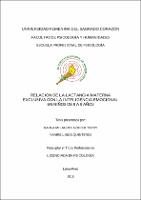| dc.contributor.advisor | Perotti Maiocchi, Gabriella Francesca | |
| dc.contributor.author | Godier Terry, Karla Milagros | |
| dc.contributor.author | Lindo Quinteros, Yanire | |
| dc.date.accessioned | 2016-09-22T22:14:01Z | |
| dc.date.available | 2016-09-22T22:14:01Z | |
| dc.date.issued | 2016 | |
| dc.identifier.uri | http://hdl.handle.net/20.500.11955/161 | |
| dc.description.abstract | La presente investigación pretende dar un acercamiento acerca de la relación de la lactancia materna exclusiva y la inteligencia emocional del niño; se evaluaron 60 niños entre 8 y 9 años de la ciudad de Pucallpa, de un centro de estudios estatal. Para ello, se utilizó una encuesta para las madres sobre lactancia materna y el Cuestionario de Inteligencia Emocional de Barón-ICE abreviado. Entre los hallazgos se encontró relación en dos escalas, la de adaptabilidad e interpersonal; viéndose un óptimo componente emocional en los niños que tuvieron lactancia materna exclusiva. Se tiene que tener en cuenta el lugar donde fue ejeutado la evaluación ya que fue en Pucallpa, Ucayali donde el ambiente sociocultural y el ritmo de vida es diferente al de la capital; dándose más prioridad en Pucallpa a la lactancia materna por diversas razones, porque no está promocionado masivamente el consumo de leche en fórmula, por la cercanía del centro de trabajo de la madre a su casa ya que es una ciudad pequeña, y porque el 70 % de mujeres se dedican a un trabajo en casa, lo que les da más facilidad de estar cerca a sus hijos y de cubrir sus necesidades rápidamente cuando son bebés. | es_PE |
| dc.description.abstract | This research aims to provide an approach about the relationship of exclusive breastfeeding and the child's emotional intelligence; they were evaluated 60 children between 8 and 9 years of the city of Pucallpa, a state research center. For this, the Emotional Intelligence Questionnaire abbreviated Baron-ICE was used. Among the findings significance was found in two scales, adaptability and interpersonal; seeing an optimal emotional component in children who were exclusively breastfed. You have to take into account where the evaluation was executed as it was in Pucallpa, Ucayali where the sociocultural environment and the pace of life is different from the capital; giving more priority in Pucallpa breastfeeding for various reasons, because it does not massively promoted the consumption of milk formula, by the proximity of the workplace from a mother to her home because it is a small town, and because 70% of women are engaged in a work at home, giving them more easily to be near their children and quickly meet their needs when they are babies. | es_PE |
| dc.description.uri | Tesis | |
| dc.format | application/pdf | es_PE |
| dc.language.iso | spa | es_PE |
| dc.publisher | Universidad Femenina del Sagrado Corazón | es_PE |
| dc.rights | info:eu-repo/semantics/closedAccess | es_PE |
| dc.rights.uri | https://creativecommons.org/licenses/by-nc-nd/4.0/ | es_PE |
| dc.source | Repositorio Institucional - UNIFÉ | |
| dc.subject | Inteligencia emocional | |
| dc.subject | Lactancia materna | |
| dc.subject | Niños | |
| dc.subject | Psicología--Tesis | |
| dc.title | Relación de la lactancia materna exclusiva con la inteligencia emocional en niños de 8 a 9 años | es_PE |
| dc.type | info:eu-repo/semantics/bachelorThesis | es_PE |
| thesis.degree.name | Licenciada en Psicología | es_PE |
| thesis.degree.grantor | Universidad Femenina del Sagrado Corazón. Facultad de Psicología y Humanidades | es_PE |
| thesis.degree.level | Título Profesional | es_PE |
| thesis.degree.discipline | Psicología | es_PE |
| dc.subject.ocde | https://purl.org/pe-repo/ocde/ford#5.01.01 | es_PE |
| renati.advisor.dni | 08245945 | |
| renati.advisor.orcid | https://orcid.org/0000-0002-6602-9530 | es_PE |
| renati.author.dni | 70322246 | |
| renati.author.dni | 47190050 | |
| renati.discipline | 313016 | es_PE |
| renati.level | https://purl.org/pe-repo/renati/level#tituloProfesional | es_PE |
| renati.type | https://purl.org/pe-repo/renati/type#tesis | es_PE |
| dc.publisher.country | PE | es_PE |


